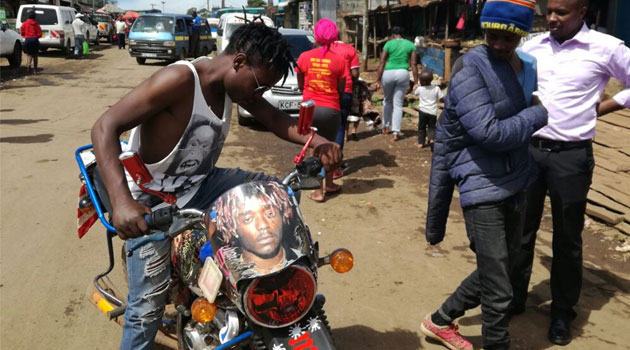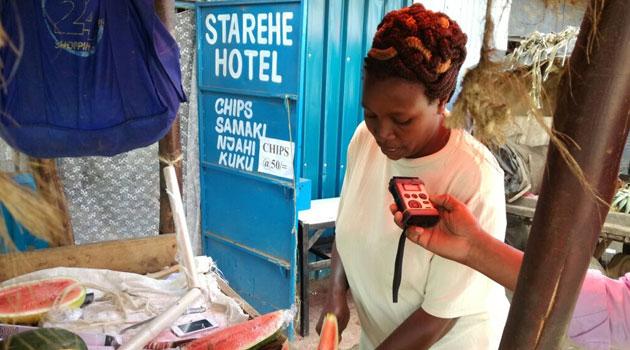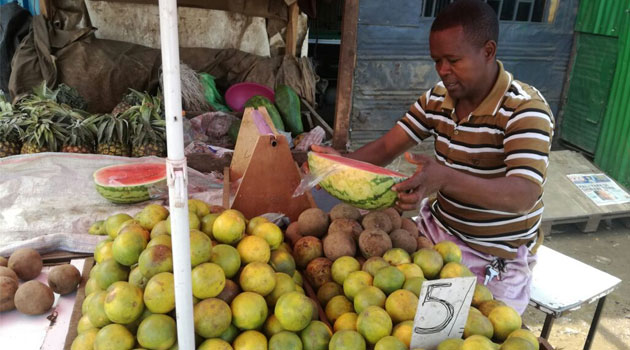
Unlike some months ago, during 2017 Kenya’s disputed pro-longed electioneering period, this time it was coming from roadside cooking pots, as traders try to beat their deadline before their clients arrive/CFM NEWS
NAIROBI, Kenya, Apr 9 – A cloud of black smoke could be seen billowing from different points in Congo and area 46, in the informal sector of Kawangware in Nairobi, on Monday.
Unlike some months ago, during 2017 Kenya’s disputed pro-longed electioneering period, this time it was coming from roadside cooking pots, as traders try to beat their deadline before their clients arrive.
In the about 10 kilometers stretch in the highly populated neighbourhood and once a no-go-zone, Kenyans could be seen on the move and no one can easily notice the presence of a stranger, like in the case of this reporter.
That was not the case some few months ago when a section of Kenyans were bitter of the election result more so the re-election of President Uhuru Kenyatta, who won easily in the repeat polls, after his main rival, Kenya’s longtime opposition chief Raila Odinga boycotted.
In Kawangware, property worth millions of shillings was destroyed; women raped by youthful gangs- authorities are yet to release the actual figure- while some people were left homeless and orphaned, during what the locals termed as a “politically sponsored violence.”
Already, the “peace” paintings on the streets of Kawangware have long faded, political posters have worn out and one would struggle to see the aftermath of one of the most tense electioneering period in Kenya.
But as you walk further, an entertainment joint that was torched by rowdy youths is yet to be rebuilt, though cordoned off from the public, probably to act as a reminder of the dark past.
A one-acre plot that had residential iron sheet houses and shops was burnt down, but the owners have since reconstructed, even some better structures. Business is booming in the area.
Capital FM News interacted with locals, some who are victims, over the fast-changing political landscape in Kenya.
Margaret Wambui lost all her belongings after her shop was burnt down by angry protestors, agitated by two things; their perceived support for the Jubilee administration and for voting, while a majority in the area boycotted.
Odinga has a massive following in the area.
“We have moved on…” those were her first words before she retreated to a lengthy silence and then added, “It is sad that we fought because of the same politicians, who are now dining together.”
Loudly, and as if addressing someone, she wondered, “when will Kenyans learn? When will the poor learn?”
Then posed as if expecting an instant response.
Her appeal to Kenyans, “don’t allow politics to divide you along tribal lines.”
George Khaminwa is a boda-boda rider, and he is from a trip when we caught up with him.
He says business is booming, but can point out how they underwent massive loss during the political debacle.
And just like millions of Kenyans did not expect a quick ‘reconciliation’ followed by a “golden handshake” between President Kenyatta Odinga, him too, “did not see it coming.”
“We only wanted baba (Raila Odinga) but they have since united. It is good, even though we did not get the leader we wanted, there is peace and we can feed our families.”

Those were sentiments shared by his counterpart in the business, Wallace Kimani, who says, “for peace, we support them. It is unfortunate that we lost people and even disagreed with friends over them. It should never happen again.”
Congo and Kawangware Area 46 is now a free world.
There are no heavily armed security officers patrolling the area, neither do we have hundreds of youths facing off or chanting political slogans.
One can literally ‘breath and smell’ the Kenyan spirit of oneness as you watch women pave way for men in the crowded streets, children playing beside the busy road, a group of youths talking in low tones, not about their political affiliation but about Sunday’s rugby game between Kenya’s Shujaa and Figi, and where we could have gone wrong.
But one cannot fail to wonder, for how long will this last? Will another political wave kill all this?
It is not lost to some of the locals, who spoke to Capital FM News.
“You can never tell how tomorrow will be. We can only enjoy this while it last,” a resident said.
Another said, “the problem is that we have some people who cannot see beyond politics. But there is hope.”
President Kenyatta and Odinga have committed to work towards uniting Kenyans, in a detailed pact.
No much ground has been covered since the May 9 handshake, at least in the eyes of members of the public.
During and after the August 8 election and that of October 26, tens of people lost their lives during protests, a majority were shot dead by police officers.
Of those killed, women and children were not spared.
These rekindled memories of Kenya’s darkest moments of 2007-2008 post-election violence, that left 2000 people dead and 600,000 others internally displaced.















































